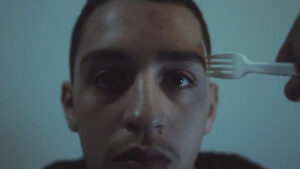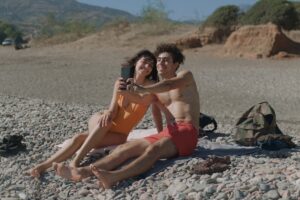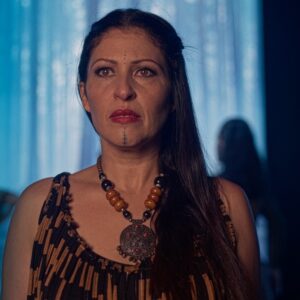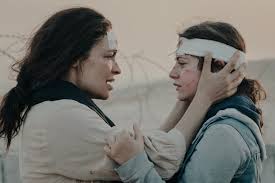As the first Saudi film ever to participate in the Cannes Film Festival, Tawfik Alzaidi’s Norah represents the Kingdom’s new wave of opening up to arts, culture and cinema. The story was shot in the southwest of the country as part of one of Saudi’s biggest film and investment projects, AlUla, and has a slow-burn vibe with a bit of the Western about it. In a classic opening scene, a stranger arrives unannounced in a remote village in the Saudi desert.
The stranger is a teacher, Nader (Yaqoub Alfarhan), assigned by the government to teach kids reading and writing. He arrives in his modern car, very unlike the practical pickup trucks used by the villagers, and he is wearing sunglasses and pants instead of the national costume. One of the elders, Abu Salem (Abdullah Alsadhan), and the Indian shopkeeper Madhur (played by actor Saleemriaz) question him about his intentions. Basically, Nader is presented as everything the locals are not: educated, an art lover, and clearly open to other cultures.
At this point the story splits into two strands, as we are introduced to Norah (Maria Bahrawi). This teenage orphan, who was raised by her aunt after her parents’ death, longs for everything the city folks do. She buys illegally smuggled and sometimes censored magazines about celebrities and fashion, listens to pop music, and is eager to look as pretty as the photo shoots she sees. Even in the confined space she lives in and the strict society she was raised in, she is a rebel. She is engaged to a man in the village, an arranged marriage she is desperate to postpone until her brother finishes his education.
The paths of the two misfits must, of course, cross. One day the artistic teacher tries to motivate his class, which consists only of boys, by promising to draw the student with the highest marks. Norah’s young brother Nayaf (Abdulrahman Alwafi) is the winner, and when she sees his portrait, she makes contact with the teacher.
The most beautifully performed scenes in the film are when Nader agrees to draw Norah. The arrangement is for them to meet secretly in the presence of the Indian shopkeeper, and on the condition that Norah won’t remove her burqa but will show only her face. The scenes encapsulate the film’s great dilemma: how to settle between one’s own desires and the desires of the environment. The aesthetics of the scene, beautifully directed by Alzaidi, quietly bring to mind the decades in which Saudi artists and film enthusiasts (Alzaidi included) had to challenge societal norms to pursue what they wanted.
The acting is convincing throughout. As Norah, Bahrawi embodies the naive yet rebellious teenager determined to outsmart her conservative surroundings and remove her shackles, while Alfarhan, playing the teacher, gradually unveils himself to be a former artist who resists the conservatives in the village by drawing portraits. Kudos to Alzaidi for including a character based on a southeast Asian immigrant, a crucial part of Saudi Arabia’s demographic and culture, people who are often overlooked or portrayed only from a comic perspective in Saudi popular culture.
The film also airs conservative viewpoints, showing the locals’ paranoia and panicked fear that the mere fact of a man drawing a woman will lead to an immoral act, in the classic artist-model stereotype. Nader and Norah, whose relationship is based on mutual interest in freedom of expression, bring a real challenge to this notion, as each tries to achieve their goal.
The allegory in the film is strong, but Alzaidi is careful not to suggest a clichéd clash between the urban and the rural, as the laws that limit creativity and art refer to the city. Nader is in the vanguard as a young teacher who, in a community where most people are illiterate, becomes a beacon of hope and enlightenment to educate their children. He is also the one who knows how to draw portraits, has been to the movies, smokes Red Marlboros, and knows who Michael Jackson is, yet he also respects Bedouin and local customs. His passion for the arts, culture, and progressiveness is not because he comes from the city, but because he chooses to champion the freedom to be self-determined.
The film hits three birds with one stone: it should appeal to a Western audience eager to dissect the radical change Saudi Arabia has undergone, it stays true to the uniqueness of the Saudi context which Alzaidi is a part of, and it is a fine drama.
The idea that ten years ago the director could have been arrested for making the same film is shocking. Alzaidi comes from a society that has always loved art and culture, even when these things could only be enjoyed underground. Set in the 1990’s, the film celebrates the present moment and salutes the artists who previously lived under the concrete of social conservatism.
However, while successfully walking a fine line between appealing to international markets and presenting an honest picture of a long-gone society, the film’s narrative presents little that is new to a Saudi or an Arab audience. This is a challenge many filmmakers in the MENA region face when they screen their films internationally. Nevertheless, Alzaidi’s debut is a promising and refreshing start to a serious Saudi cinema that is invested in understanding the country’s past, and creating a wave of filmmakers who can freely navigate different genres to tailor their stories. As the film ends, we know little about the fate of the Nader and Norah, but the portrait is satisfyingly present, sending a message of hope.
Director, screenplay: Tawfik Alzaidi.
Cast: Yaqoub Alfarhan, Maria Bahrawi, Abdulrahman Alwafi, Abdullah Alsadhan, Aixa Kay, Abdulrahman Alwafi, Saleemriaz.
Cinematography: Shaun Harley
Editing: Mounir Soussi
Music: Omar Fadel
Sound: Shaun Froes
Production company: Black Sugar Pictures
World sales: Cercamon
Venue: Cannes Film Festival (Un Certain Regard)
In Arabic
94 minutes

.png)






Hey darling, want to hang out? – https://u.to/IGq5IA?Eduttnani
MEYJTJ734822MAERWETT
mdys1r
Hey darling, want to hang out? – https://is.gd/2xVU7z?Eduttnani
I was studying some of your posts on this website and I believe this website is really instructive! Retain putting up.Raise blog range
Hey darling, want to hang out? – https://rb.gy/7rnhss?Cill
Hey darling, want to hang out? – https://is.gd/2xVU7z?Eduttnani
Hey darling, want to hang out? – http://surl.li/ulebc?Eduttnani
Hey darling, want to hang out? – https://rb.gy/7rnhss?Cill
Hey darling, want to hang out? – https://is.gd/2xVU7z?Eduttnani
Hey darling, want to hang out? – https://is.gd/2xVU7z?Eduttnani
Hey darling, want to hang out? – https://is.gd/2xVU7z?Eduttnani
Can’t wait to show you a good time tonight. – https://rb.gy/7rnhss?Cill
Can’t wait to show you a good time tonight. – https://goo.su/zARWg?Eduttnani
I’ve been naughty, want to help me with that?) – https://rb.gy/7rnhss?Cill
Can’t wait to show you a good time tonight. – https://goo.su/zARWg?Eduttnani